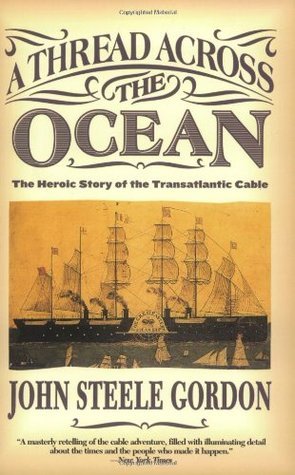Interesting story, but a mediocre book. The laying of the transatlantic telegraph cable was the Internet revolution of the 19th century, and the tale of how this enterprise was completed is very compelling.
But that tale isn't enough for the author, who pads his book with numerous tangents about ancillary subjects that add nothing to the main story...often these tangents don't even provide much relevant background information (which is why I think the author included them in the first place). The frequent footnotes are particulalry useless and annoying.
Other problems: The author is prone to hyperbole when describing the significance of the entire venture and of the various components that accounted for its success, and I often found his descriptions of the science and technological innovation involved to be unclear (though that might be more my challenge than the author's). Finally, though the author lists about thirty books and other materials in his bibliography, he only appears to have used about six of them....these six books seem to account for over 80% of his source notes. The author often seems to pad the book with lengthy but not very useful quotes from these sources when there isn't much action going on.
But, despite the author's many shortcomings, this is a neat story, and one that I have always been interested in. I considered the laying of the first telegraph cable across the ocean to be a major technological and business accomplishment, but this book opened my eyes to exactly how challenging this endeavor was. The companies that collaborated on this enterprise undertok a major attempt in 1857, two in 1858, and one in 1865 before finally achieving true success in 1866 (the second 1858 attempt succeeded in laying a cable across the ocean, but it stopped working after a few weeks).
Entreprenurs and others interested in business will be inspired by the commitment and confidence of the leading figure of the entire venture, Cyrus Field. From start to finish, he oversaw the entire project, and was instrumental in raising the funds, securing the permission and cooperation of the governments involved, finding the scientists and technicians with the right attitude to get the job done, and maintaining a belief in all concerned that the enterprise would eventually be both successful and porfitable. In the end he was right on all counts.
P. S. My paperback edition of the book has some great maps and some very good photos and illusrations. Kudos to the author for including those; they enhanced my understanding of the story.

